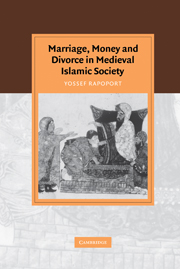Book contents
- Frontmatter
- Contents
- Acknowledgments
- Glossary
- List of abbreviations
- Introduction
- Chapter 1 Marriage, divorce and the gender division of property
- Chapter 2 Working women, single women and the rise of the female ribāṭ
- Chapter 3 The monetization of marriage
- Chapter 4 Divorce, repudiation and settlement
- Chapter 5 Repudiation and public power
- Conclusion
- Bibliography
- Index
- Cambridge Studies in Islamic Civilization
Conclusion
Published online by Cambridge University Press: 15 June 2009
- Frontmatter
- Contents
- Acknowledgments
- Glossary
- List of abbreviations
- Introduction
- Chapter 1 Marriage, divorce and the gender division of property
- Chapter 2 Working women, single women and the rise of the female ribāṭ
- Chapter 3 The monetization of marriage
- Chapter 4 Divorce, repudiation and settlement
- Chapter 5 Repudiation and public power
- Conclusion
- Bibliography
- Index
- Cambridge Studies in Islamic Civilization
Summary
Compared to other medieval matrimonial regimes, such as those of Latin Europe or of Sung China, the most distinctive feature of marriages in medieval urban Islam was the ubiquity of divorce. Polygamy and concubinage, as in other medieval societies, appear to have been limited in scope. In Near Eastern marriages, as in contemporary marriages in Europe or China, the dowry brought by the bride, rather than the marriage gift of the groom, was the significant gift at marriage. But, while Chinese or European marriages were relatively stable affairs, for the most part ending with the death of one of the spouses, a very large number of marriages in medieval Cairo, Damascus and Jerusalem ended in divorce. Conjugal units of medieval urban Islamic society, already hit by high mortality, were further broken up and dispersed. By their very nature, the high rates of divorce severely and institutionally undermined the ideal patriarchal order, in which society was imagined as composed of households led by men who exercised control over their wives, children and slaves.
Given the destabilizing impact of divorce, this book has attempted to explain why divorces were, nonetheless, so common. As is the case with the soaring rates of divorce in Western societies in the latter half of the twentieth century, the answer cannot be simple or one-dimensional.
- Type
- Chapter
- Information
- Marriage, Money and Divorce in Medieval Islamic Society , pp. 111 - 114Publisher: Cambridge University PressPrint publication year: 2005



